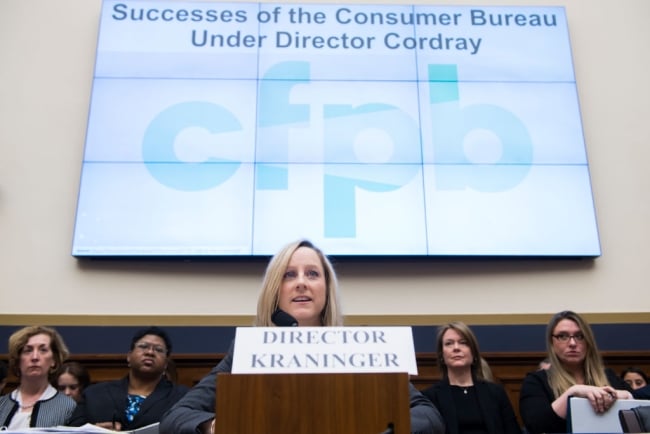You have /5 articles left.
Sign up for a free account or log in.

CFPB Director Kathy Kraninger
Getty Images
The Consumer Financial Protection Bureau is bringing on a former student loan servicing executive to oversee the student loan industry.
CFPB director Kathy Kraninger named Robert G. Cameron, who was a top official at the Pennsylvania Higher Education Assistance Agency, as the agency's student loan ombudsman. The company is one of the largest loan servicers, which contract with the federal government to handle payments on millions of student loans.
Cameron, a U.S. army veteran, has overseen litigation, compliance and risk mitigation efforts at PHEAA. In a press release announcing the appointment, CFPB noted Cameron has managed compliance efforts with state and federal laws at the company, including the Dodd-Frank Act. He is also a colonel and staff judge advocate for the Pennsylvania Army National Guard.
The loan ombudsman's purview includes oversight of private student loans as well as loan servicers and other companies involved in the federal loan program. The position had been vacant since last August when Seth Frotman, the last ombudsman, quit in a letter that blasted the Trump administration's policies on student loans. Frotman, now the executive director of the Student Borrower Protection Center, and other consumer advocates criticized the new pick Friday, saying it indicated a disregard for the interests of borrowers. Those consumer advocates say the pick fits into a larger pattern of the Trump administration undermining the agency.
OMB Director Mick Mulvaney, who until this year also served as acting CFPB director, folded the agency's student borrower unit in 2018. And Education Secretary Betsy DeVos the previous year ended an information-sharing agreement with the agency.
"It is outrageous that an executive from the student loan company that has cheated students and taxpayers -- and is at the center of every major industry scandal over the past decade -- is now in charge of protecting borrowers' rights," said Frotman.
CFPB didn't respond to a request for comment on the criticism. Cameron told the New York Times in a statement Friday "In all of my work, my commitment has always been to serve the American people."
Rachel Fleischer, executive director of Young Invincibles, said Cameron's role at PHEAA should disqualify him for the position.
"Student borrowers need leaders who will stand up to predatory schools and lenders, not protect them as they take advantage of people pursuing a higher education," she said in a statement.
PHEAA is the only servicer that handles loan payments for the Public Service Loan Forgiveness program. The Education Department has rejected the vast majority of PSLF applicants over the last year, including many borrowers under the impression they qualified; many blamed the servicer for misinforming them about their eligibility. Massachusetts Attorney General Maura Healey sued PHEAA in 2017, accusing the company in a lawsuit of failures that cost borrowers eligibility for program. PHEAA denied the claims in the lawsuit.
State legislatures across the country have targeted loan servicers for more oversight in recent years. After servicers urged her to clarify the role of state and federal regulators, Education Secretary Betsy DeVos issued a legal interpretation last year stating that the federal government has exclusive authority for oversight of servicers.
That hasn't stopped states from continuing to add more regulations of loan companies. This year, lawmakers in nearly 10 states have created new oversight regimes targeting servicers, partly in response to arguments from advocates like Frotman who say the federal government isn't fulfilling its oversight role.
Consumer advocates indicated that the pick would fuel calls for states to be more active on student loans.
"The student loan ombudsman should protect student loan borrowers from poor practices in the student loan industry," said Debbie Goldstein, executive vice president of the Center for Responsible Lending. "Instead, by appointing a former student loan servicer executive to oversee the student loan market, the federal government is signaling that it is not interested in the nation's 44 million student loan borrowers or their families. In the absence of real federal oversight, states have no choice but to step up and protect student loan borrowers."








